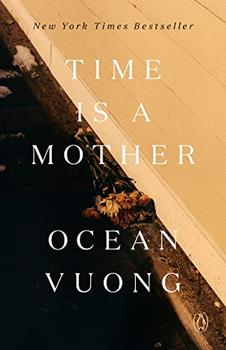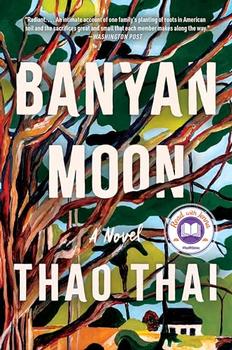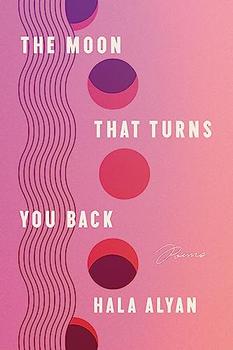Summary | Excerpt | Reviews | Beyond the book | Read-Alikes | Genres & Themes | Author Bio

Readers familiar with Vuong's debut collection of poetry, Night Sky with Exit Wounds, and his semi-autobiographical novel, On Earth We're Briefly Gorgeous, will find themselves on familiar ground with his second collection of poems. A natural continuation of the themes explored in his previous work, Time Is a Mother chronicles Vuong's experiences as a queer Vietnamese American, and his complex relationship with his mother, an immigrant single parent unable to communicate in English.
Though we have seen Vuong tackle these topics before, his perspective has undoubtedly changed since the loss of his mother to cancer. The bittersweet reality of life persevering in the face of death and the interplay between grief and memory are central concerns in these new pieces. He navigates the difficulty of capturing his sadness, and the struggles faced by his mother as a refugee from Vietnam, without allowing their pain to be tokenized. He explains how minority voices can be exploited by publishers, their gestures toward diversity just a ploy for profit: "Because everyone knows yellow / pain, pressed into American letters, turns to gold. / Our sorrows Midas touched."
Though she could never fully understand his work due to her illiteracy, Vuong's mother was a source of support, and the gratitude he feels for her in return is clear in his words: "[…] reader who / cannot read / or write you wrote a son / into the world with no / words but a syllable so much / like a bullet its heat fills you."
The aforementioned idea of contradictions is also reflected in his commentary on sexuality, with sex and the exploration of bodily desire presented as bringers of both joy and sadness in equal measure. The imagery employed takes this idea even further. When discussing his relationship with his own body and identity, Vuong is just as likely to describe them as a prison ("childhood / is only a cage / that widens") as he is to depict them as something full of hope ("I'm on the edge of myself & these / aren't wings, they're futures"), ultimately settling on a touching form of acceptance ("Because this body is my last address").
His outlook on the world around him is equally fraught with complexity. At times, nature is presented as a source of anxiety, in lines such as, "I'm still afraid / of butterflies / how they move so much / like a heart / on fire" and "[…] the birds are / just holes in the gunshot / sky." Just as often, however, moments of quiet beauty hint at comfort and continuity: "October leaves coming down, as if called."
It's standout, evocative images like those quoted above that characterize Vuong's work at its best, but the pieces are also structurally interesting. Many of the poems flow freely, featuring unexpected line breaks and little in the way of punctuation. This lends them an almost breathless quality, as though thoughts and emotions are spilling forth unchecked — apt given the raw emotion at hand. But while the writing on display here doesn't quite match the urgency or the gut-punch delivery of his debut collection, there is still effortless poignancy throughout, and it is this that makes his work so affecting.
With his remarkable command of the form, Vuong invites readers to pause, contemplate and see themselves and their own experiences reflected in the text. The poems are deeply personal, but their themes — including family, grief and selfhood — are universally resonant.
![]() This review was originally published in The BookBrowse Review in June 2022, and has been updated for the
June 2023 edition.
Click here to go to this issue.
This review was originally published in The BookBrowse Review in June 2022, and has been updated for the
June 2023 edition.
Click here to go to this issue.

If you liked Time Is a Mother, try these:

by Thao Thai
Published 2024
A sweeping, evocative debut novel following three generations of Vietnamese American women reeling from the death of their matriarch, revealing the family's inherited burdens, buried secrets, and unlikely love stories.

by Hala Alyan
Published 2024
From the author of The Arsonists' City and The Twenty-Ninth Year, a new collection of poetry that traces the fragmentation of memory, archive, and family–past, present, future–in the face of displacement and war.
The whole problem with the world is that fools and fanatics are always so certain of themselves, and wiser people ...
Click Here to find out who said this, as well as discovering other famous literary quotes!
Your guide toexceptional books
BookBrowse seeks out and recommends the best in contemporary fiction and nonfiction—books that not only engage and entertain but also deepen our understanding of ourselves and the world around us.